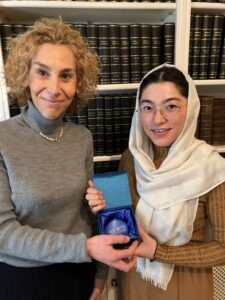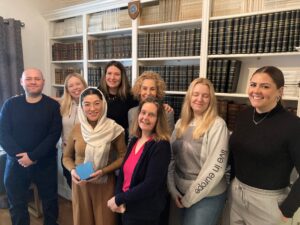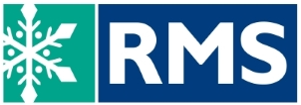Where did you go and what did you do?
I recently completed my placement with the Royal Microscopical Society (RMS), a prestigious non-profit academic society.
At the RMS, an excellent team of non-scientist members collaborates with established scientists and early-career researchers across the globe to better serve their communities through outstanding outreach activities, career development support, organizing national and international conferences, providing funding opportunities, and many other initiatives that help individual scientists advance in their careers.
During my placement, I worked on the re-launch of the Ambassadorial Project, which involved attending meetings with the RMS’s current ambassadors (including international ambassadors), engaging with other academic societies, participating in section committee meetings, and presenting my work at conferences. As part of this project, I created feedback reports, an Ambassadorial Project report that included a strategy for targeting specific geographical regions when recruiting ambassadors, application forms, templates for organizing training sessions and annual meetings, a budget, and an outreach activity plan.
In addition to the Ambassadorial Project, I also contributed to the Micrograph Cataloguing Project, where I catalogued a collection of micrographs for RMS members to access as part of their membership benefits.
The conferences I attended during this period include:
- RMS General Annual Meeting – London
- Frontiers Event (2 days) – Oxford
- SEMT Meeting – London
- Super-Res in the North – University of Leeds (Delivered a project presentation)
- Facility Meeting – Bristol
What made you want to do that particular PIPS?
During my PIPS application research and application processes, I took the time to evaluate my strengths and weaknesses as a PGR and aimed to use the PIPS opportunity to address areas where I needed improvement. I consider myself a quick learner who excels at picking up new skills, particularly practical ones. However, I recognized certain weaknesses, such as having a limited professional network, a lack of familiarity with professional etiquette for scientists, and areas for improvement in my writing and written communication skills. Additionally, I wanted to broaden my understanding of diverse research areas to better inform my future career decisions.
I chose the RMS for my placement because it is a dynamic, academic-based charitable society where established scientists and early-career researchers work collaboratively to serve their communities and tackle often-overlooked challenges that scientists encounter in their daily professional lives. RMS offers a wealth of opportunities that I could utilize to improve my weaknesses while contributing meaningfully to their initiatives.
What skills have you gained from your PIPS?
To establish a report on building the groundwork for the Ambassadorial Project, I arranged meetings with current ambassadors both within and outside the UK, as well as with other academic societies, to collect feedback on how the RMS can better manage and deliver its Ambassadorial program. I then compiled a detailed report on how to best utilize this feedback and implement effective strategies used by other societies when running their Ambassadorial programs.
I provided weekly reports and presentations of my progress, along with plans for future work, to my placement supervisor and presented my findings in larger meetings. These experiences greatly enhanced my communication, presentation, writing, planning, and organizational skills, as well as my overall confidence.
Attending outreach and Section committee meetings gave me valuable insights into the challenges faced by academic scientists and helped me develop an understanding of the types of outreach activities we can implement to better serve our communities.
What has been the impact (or likely future impact) of your PIPS?
The package I developed will be used when the RMS re-launches its Ambassadorial Program in the next few months.
This PIPS opportunity allowed me to refine existing skills and acquire new ones that would have been challenging to develop solely through my PhD. For instance, attending multiple conferences over the three months gave me valuable opportunities to practice and enhance my networking skills. Additionally, participating in committee meetings with senior scientists and engaging in discussions about current issues significantly improved my ability to express my thoughts and opinions more concisely and respectfully.
My daily interactions with both scientists and non-scientists also helped me gain a deeper understanding of professional etiquette, which I personally consider one of the most valuable takeaways from this PIPS experience.
How would you sum up your PIPS experience?
I have had a wonderful experience and thoroughly enjoyed working on the Ambassadorial Project. The people I worked with at the RMS were incredibly amazing, supportive, and considerate. I have learned invaluable lessons, enhanced my skills, and built meaningful connections with senior scientists both within the UK and internationally.
What advic e would you give to other PGRs about PIPS?
e would you give to other PGRs about PIPS?
From personal experience, it is important to conduct a self-evaluation of your academic work before applying for a PIPS project. This process allows you to carefully assess and determine what you want to achieve from your PIPS that may not be attainable through your PhD alone.

